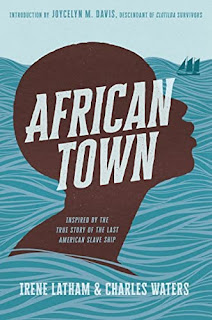Title: African Town
Author: Irene Latham and Charles Waters
Year published: 2019
Category: YA fiction (historical, verse)
Pages: 448 pages
Rating: 4.5 out of 5
Location: (my 2023 Google Reading map): USA (AL), Benin, Nigeria
Summary: In 1860, long after the United States outlawed the importation of enslaved laborers, 110 men, women and children from Benin and Nigeria were captured and brought to Mobile, Alabama aboard a ship called Clotilda. Their journey includes the savage Middle Passage and being hidden in the swamplands along the Alabama River before being secretly parceled out to various plantations, where they made desperate attempts to maintain both their culture and also fit into the place of captivity to which they'd been delivered. At the end of the Civil War, the survivors created a community for themselves they called African Town, which still exists to this day. Told in 14 distinct voices, including that of the ship that brought them to the American shores and the founder of African Town, this powerfully affecting historical novel-in-verse recreates a pivotal moment in US and world history, the impacts of which we still feel today.
Review: This novel is a CYBILS finalist so that encouraged me to read it. The fact that it's in verse makes the story move quickly. I also really like that it's told from many perspectives: the ship (cool, right?), the enslavers, and various Africans who were enslaved. They alternate pages, in random character order, which fills in the story and makes it flow really well.
This is such a complete story, following the characters from capture in West Africa through the Middle Passage to Alabama, through the US Civil War and emancipation, and finally to life as free people and the creation of African Town. The story moves quickly, covering a lot of events and issues, showing both sides of the story, which is powerful. Having each character's chapters written in their own voice with different type set ups really helped keep them all straight and make each one distinct.
I really liked that there are multiple additions at the end: an afterword about writing historical fiction, the follow up with each character's real life equivalent (what happened to them and when they died, etc), a timeline of events, and glossary. This novel is a great way for readers to learn about all aspects of slavery in the US, but also of the empowerment and love of a community.
Challenges for which this counts:





No comments
Post a Comment